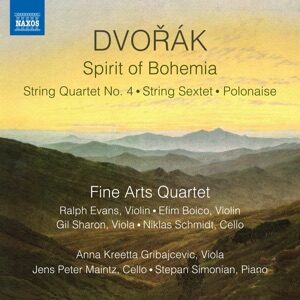It’s about time that Dvořák’s fascinating and gripping Fourth Quartet got some individual attention apart from big boxes of the chamber works. A single movement more than 30 minutes long, in three extended sections, the music reveals the influence of Wagner and the New German School. It represents a road not taken, as Dvořák never followed it up, and immediately afterward returned to a path at once more “classical”, formally speaking, while pursuing its harmonic audacities within the bounds of a Czech nationalist style. This last point is important. Dvořák never gave up his love for adventurous harmony. He merely ceased imitating Wagner’s particular version of it, and in the process he found himself.
In any case, the central Andante religioso survived to become the lovely Notturno for string orchestra. It sounds like a cross between Rachmaninov and the Siegfried Idyll, only it predates both! There’s no question that Dvořák was very good at what he was doing. The quartet’s outer sections also invite comparison to late Beethoven, with their sometimes gnarly counterpoint and sense of struggle. In short, the work deserves to return to the repertoire, and the only reason I can see that it hasn’t is because it doesn’t sound like typical Dvořák. Happily, the Fine Arts Quartet does an excellent job allowing the music to unfold on its own terms, offering sensitive, well-balanced, and timbrally vibrant playing that sustains the piece over its entire length.
The Sextet of 1878 (eight years after the Fourth Quartet) shows the composer in full nationalist mode, with a “Dumka” slow movement and a “Furiant” for a scherzo. Its concluding theme and variations is especially outstanding. Here is yet another work that, however frequently recorded, has not received the attention that it deserves in concert, perhaps because sextets are awkward to program. The concluding Polonaise in A major makes a fine encore to an unusually well-rounded program, one that presents Dvořák as a composer of much wider range than many would have us believe. The title of the disc, Spirit of Bohemia, is typically silly and not entirely relevant, but with fine engineering I can recommend this release without hesitation.
































